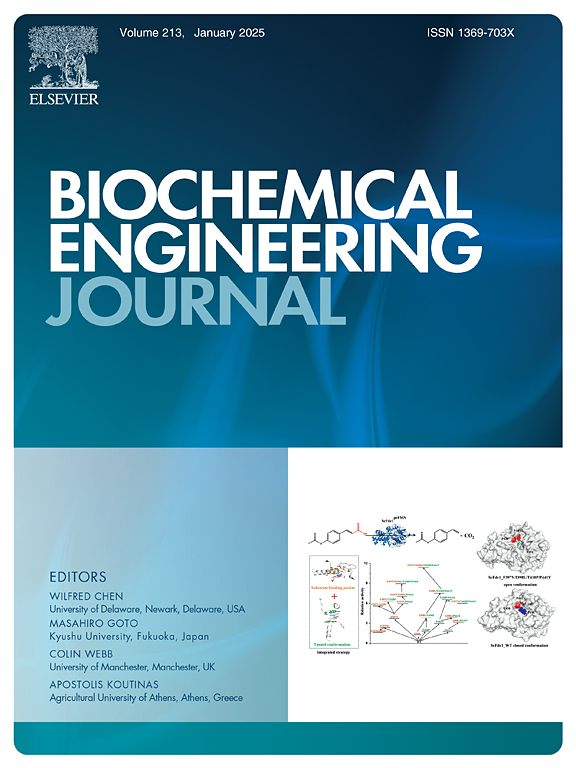从工业马铃薯淀粉废水中高效生产甲烷的新型管式单室微生物电解池
IF 3.7
3区 生物学
Q2 BIOTECHNOLOGY & APPLIED MICROBIOLOGY
引用次数: 0
摘要
微生物电解池(MEC)与厌氧消化(AD)的结合为提高高 COD 废水的甲烷产量带来了巨大希望。然而,高效的 MEC-AD 反应器设计仍然遥遥无期。在此,我们建造了一个新型管式单室 MEC-AD 反应器来处理马铃薯淀粉废水(COD 超过 20,000 mg/L)。不锈钢阴极和阳极的同心紧凑设计降低了内阻,从而提高了甲烷产量。在阳极上施加 -0.2 V 对 Ag/AgCl 的电压,甲烷产量比开式回路增加了 1.73 倍,水力停留时间缩短了一半。此外,反应器的平均甲烷含量达到 82.57%,比开式回路高出 23.89%。反应器的化学需氧量总去除率为 92.2%,比开式回路高 24%。此外,维持 pH 值所需的碱消耗量减少到传统厌氧消化法的六分之一,从而防止了挥发性脂肪酸的积累。微生物分析表明,阳极生物膜和阴极生物膜中分别高度富集了 Geobacter(63.4%)和 Methanobacterium(96.8%)。在 MEC-AD 系统中,发酵菌的比例也有所增加。这些结果证明了管式单室 MEC-AD 反应器在提高马铃薯淀粉废水甲烷产量方面的有效性,具有很强的放大应用潜力。本文章由计算机程序翻译,如有差异,请以英文原文为准。
A novel tubular single-chamber microbial electrolysis cell for efficient methane production from industrial potato starch wastewater
The integration of microbial electrolysis cells (MEC) with anaerobic digestion (AD) shows great promise for enhancing methane production from high-COD wastewater. However, an efficient MEC-AD reactor design remains elusive. Here, a novel tubular single-chamber MEC-AD reactor was constructed to treat potato starch wastewater (COD over 20,000 mg/L). The concentric and compact design of the stainless-steel cathode and anode reduced internal resistance, resulting in enhanced methane production. Applying −0.2 V vs. Ag/AgCl to the anode increased methane production by 1.73 times compared to the open circuit and halved hydraulic retention time. Moreover, the reactor achieved an average methane content of 82.57 %, which was 23.89 % higher than the open circuit. The reactor showed a total COD removal of 92.2 %, which was 24 % higher than the open circuit. Additionally, base consumption to maintain pH was reduced to one-sixth of that in conventional AD, preventing volatile fatty acid accumulation. Microbial analysis showed Geobacter (63.4 %) and Methanobacterium (96.8 %) were highly enriched in the anode and cathode biofilms, respectively. The proportion of fermentative bacteria also increased in the MEC-AD system. These results demonstrate the effectiveness of the tubular single-chamber MEC-AD reactor in enhancing methane production from potato starch wastewater, with strong potential for scale-up applications.
求助全文
通过发布文献求助,成功后即可免费获取论文全文。
去求助
来源期刊

Biochemical Engineering Journal
工程技术-工程:化工
CiteScore
7.10
自引率
5.10%
发文量
380
审稿时长
34 days
期刊介绍:
The Biochemical Engineering Journal aims to promote progress in the crucial chemical engineering aspects of the development of biological processes associated with everything from raw materials preparation to product recovery relevant to industries as diverse as medical/healthcare, industrial biotechnology, and environmental biotechnology.
The Journal welcomes full length original research papers, short communications, and review papers* in the following research fields:
Biocatalysis (enzyme or microbial) and biotransformations, including immobilized biocatalyst preparation and kinetics
Biosensors and Biodevices including biofabrication and novel fuel cell development
Bioseparations including scale-up and protein refolding/renaturation
Environmental Bioengineering including bioconversion, bioremediation, and microbial fuel cells
Bioreactor Systems including characterization, optimization and scale-up
Bioresources and Biorefinery Engineering including biomass conversion, biofuels, bioenergy, and optimization
Industrial Biotechnology including specialty chemicals, platform chemicals and neutraceuticals
Biomaterials and Tissue Engineering including bioartificial organs, cell encapsulation, and controlled release
Cell Culture Engineering (plant, animal or insect cells) including viral vectors, monoclonal antibodies, recombinant proteins, vaccines, and secondary metabolites
Cell Therapies and Stem Cells including pluripotent, mesenchymal and hematopoietic stem cells; immunotherapies; tissue-specific differentiation; and cryopreservation
Metabolic Engineering, Systems and Synthetic Biology including OMICS, bioinformatics, in silico biology, and metabolic flux analysis
Protein Engineering including enzyme engineering and directed evolution.
 求助内容:
求助内容: 应助结果提醒方式:
应助结果提醒方式:


